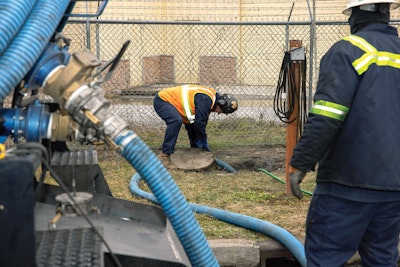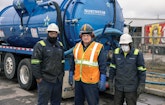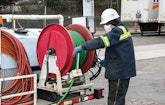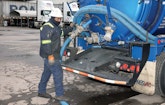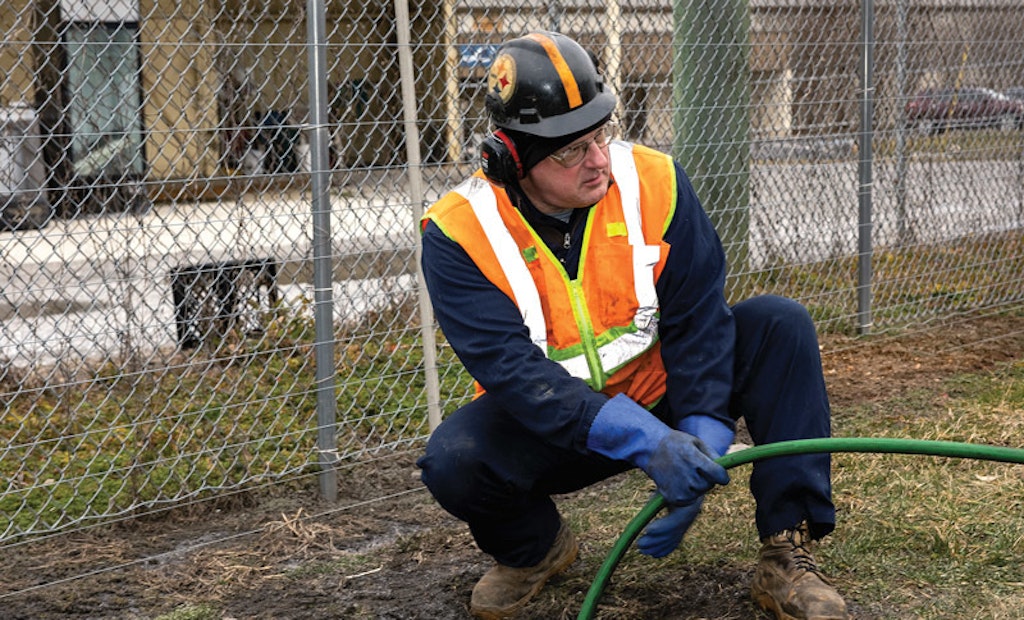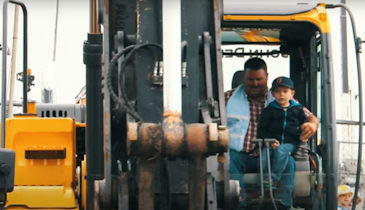Interested in Municipal/Industrial?
Get Municipal/Industrial articles, news and videos right in your inbox! Sign up now.
Municipal/Industrial + Get AlertsNorthstar Environmental Group offers a wide variety of services: cleaning oil from water, industrial and commercial waste from holding tanks, sediment from stormwater systems, and even brush from pastures.
And the Gallatin, Tennessee-based company is continuing to grow its business, during a time when some rival firms are experiencing downsizing and loss. Its success can be partially explained this way: The company kept offering services when competing companies didn’t.
“We are growing, absolutely,” says company President Colby Phillips. “We’ll expand another 10-15% this year. Our growth last year was partly because some of our competition scaled back and stopped for a while because of the virus, but we decided to keep operating. So, when clients of other companies couldn’t get immediate service, we were available. We captured a lot of that business.”
Northstar’s enlarged customer base didn’t come at the expense of public health. “We’ve been blessed,” Phillips says. “We take our protocols seriously and have had only a couple of mild cases.”
Before it was a group, the fledgling company was solely a supplier of anaerobic digester bugs, the organisms that break down organic matter to produce methane. Customers included chemical companies and livestock feedlots in Tennessee.
Two years after Northstar’s launch in 1991, however, one customer asked if the company could also periodically clean the customer’s impoundment facilities. Company founder Don Drayton Sr. said, “Sure,” bought a vacuum rig and just that quick diversified his company. Within a couple years, the bug end of the business was dropped.
New territory
Today, Northstar is cleaning facilities of national and local clients located in all contiguous 48 states. The bulk of its work is in mid-Atlantic states and the Southeast, but company trucks are heavily involved across the Midwest and into Texas. In addition, it manages stormwater cleanup in some provinces in Canada using Canadian vendors.
To do all this, Northstar sends out vac units from its Gallatin headquarters as well as from seven satellite offices scattered from Hartford, Connecticut, to Las Vegas to Tampa. Some 45 employees and their equipment are strategically situated across this company footprint, producing $10 million in annual revenue.
The multistate character of the operation means it runs into varying jurisdictional regulations. “That is one of the reasons I don’t have hair anymore,” Phillips says. “In the beginning, it was a struggle to keep up with regulations, from the state all the way down to city and township levels. Today, the bureaucracy still is there but we deal with it a lot better. With all the permit stickers showing, some of our trucks look like NASCAR racers.”
Phillips describes the company’s territorial expansion as “opportunistic more than anything else.” He recalls how, in the early 1990s, two oil company convenience store accounts contracted with the company to service oil-water separator units at their stores. The chain stores and Northstar subsequently grew in tandem, into Florida and up into the mid-Atlantic states.
“Using that service as a base,” Phillips says, “we began to seek out local carwashes to localize our cleaning business in the different markets, which helped us expand into cities like Atlanta and Houston.” The convenience store accounts carried Northstar clear across the U.S.
Successful partnerships
In 1995, a client referral landed Northstar another national account. “It was one of the largest truck stop companies and we followed it around the country,” Phillips says. The truck stop chain is still a Northstar client and that’s the other key to the company’s successful expansion: Northstar clients stay loyal.
“We have an extremely high customer retention rate,” Philllips says. “Our quality of work and customer communication help us. Paying attention to customer service is our focus. All of our clients have my cellphone number — and when Don Drayton Jr. was running it, they had his direct line.” Phillips has been company president for two years.
“If any of our clients need something, they always can reach me or anyone else they need, day or night. There’s only one thing we can sell and that’s service. Our clients are our partners. When they succeed, we succeed. Without them, we are out of business.”
Another strong component of the company’s business is its contractual partnership with a national package-delivery company. Keeping that client’s stormwater drains clear is critical. “The cardinal sin is for one of the client’s centers to flood after a storm causing delays in package sorting and loading. That company is in the business of moving packages. Our business is ensuring its stormwater drains don’t affect its business.”
Northstar ensures that outcome through regular preventive maintenance cleaning, which depending on circumstances could be weekly, annually or some interval in between. A drain that is cleaned on a timely schedule is far less apt to fail in a crunch. “Preventive maintenance eliminates a problem before it happens,” Phillips says. “The difference to a customer is three or four small service charges instead of one big bill when a clogged drain backs up and impacts the business. We try to help our clients understand the difference.”
A full fleet
Northstar Environmental Group relies on a Canadian manufacturer for its heavy vacuum equipment. Ontario-based Presvac Systems custom-builds a preferred hydrovac unit with 95-barrel capacity. The rig has 4,000-gallon dual compartments so that operators can handle liquid and solid debris separately.
“We can pull the liquids and the petroleum into one tank and then vacuum the solids into another compartment. Running blowers, we can get it loaded without the slurry,” Phillips says. “This saves our customers disposal costs — solids disposed of at one rate, liquids at another.”
Northstar has 16 of these trucks in its fleet, including more than one “floater” — a unit that has reached its seven years of optimum performance and is placed in a reserve capacity for less intense service runs. “We keep reserve capacity because stuff happens,” Phillips says. “We recycle trucks out of our daily fleet and use them as backup units. We sometimes use them on our West Coast ‘milk runs’ where trucks float all over eight Western states.”
For smaller clean-out jobs or close-quarters situations, the company calls on US Jetting trailer units. The company mostly does vacuum cleaning and jetting — fully 90% of its business is traditional vac and stormwater work. However, the company also will undertake, in the president’s words, “anything in the realm of stormwater.”
This includes stormwater pond management, construction of stormwater structures, and underground retention systems. “A few years ago, we thought there was a good overlap between the two services: maintaining stormwater systems and creating them. That was when we started pushing the stormwater services side. We have a division that handles the work.” About 15-20% of its business activity falls under the stormwater umbrella, either vacuum or construction work.
For this extra dimension of stormwater services, Northstar has Bobcat mini-excavators and skid-steer loaders in the equipment yards. When heavier dirt-moving equipment is required, it is leased.
The Bobcat compact equipment is called upon for yet another auxiliary service: land clearing. Rehabbing stormwater systems can mean cleaning up surrounding overgrown property, which is accomplished by attaching brush-cutting forestry equipment to the compact loaders. “The need was there, and we had the skid-steers so, why not? It’s another revenue source.”
Several of these facets of the business came into play recently when its package-delivery client experienced flooding on a Friday night at a Florida facility. Its stormwater system had failed from lack of maintenance — it hadn’t contracted for Northstar’s preventive service.
“We dispatched crews and patched up enough of the water system by 11 o’clock Saturday morning for the company to go back to work. From there, we refurbished the entire system,” Phillips says. The problem was diagnosed — a neighboring railroad company had crushed a stormwater line during a work project — and a new line was laid. The elevation of the system was re-engineered and the 20-year-old facility left in better condition than it had been before the flooding.
Phillips credits company owner Don Drayton Jr., son of the founder, with instituting this holistic approach to stormwater service. “He followed his entrepreneurial instincts. He saw opportunities and took them.” Northstar also undertakes stormwater projects for municipalities, bidding and contracting them individually. Its stormwater division currently is building a “pretty massive” retention pond in Gallatin for the city’s industrial park.
One client the company does not pursue is the homeowner. While Northstar does have contracts with homeowner associations, Phillips says individual property owners are “not on our radar. It is easier to work with businesses.”
Going strong
The 50-year-old company executive hired on at Northstar 25 years ago when it still was in its infancy. Having grown up on a dairy farm, Phillips was familiar with machinery and hard work. When he finished up an enlistment in the Army, he applied to be a technician at the company and was hired. “I might have embellished my capabilities,” he jokes, looking back, but worked his way up while subsequently completing various industry-specific and business management courses.
Phillips sees a bright future for Northstar. “In my opinion, it is a good time to offer the services we do.”
He is less sanguine about government regulations. “Regulations help and hurt us. The federal Clean Water Act and city and state rules set some strong requirements for environmental conditions. That helps us.” The company website stipulates that Northstar is dedicated to ensuring our clients stay in compliance with all regulatory authorities pertaining to stormwater management.
“But then you have the 400-pound gorilla that tells us we must do this and we must do that. The regulations begin to take away some of our sales opportunities,” he says. “As prices increase for work in the field and DOT regulations increase, a company can reach a tipping point where it simply cannot recover its costs.
“Anyway, it all goes back to the economy. When the economy is going well, we are doing well.”
